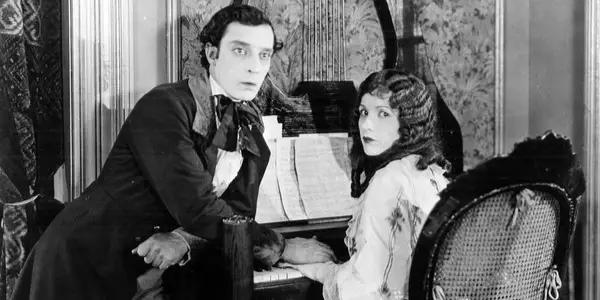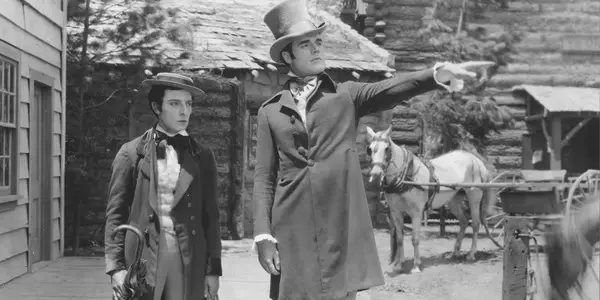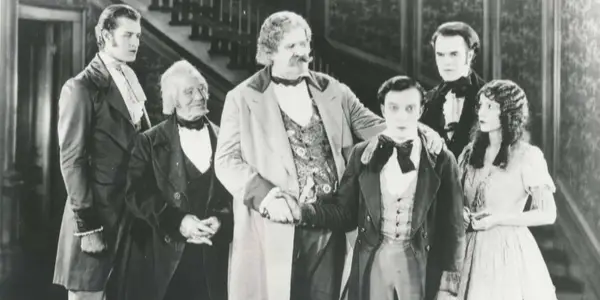A Century in Cinema: OUR HOSPITALITY (1923)

Jules Caldeira is an Associate Editor for Film Inquiry based…
Welcome to A Century in Cinema, the monthly column where I’ll be discussing films from a hundred years ago, the historical impact they had, and how they hold up today. Whether we’re covering timeless classics or obscure gems, follow along as we continue to explore…a century in cinema! WARNING: Hundred-Year-Old SPOILERS ahead!
One of the reasons I love writing this column is my perpetual curiosity as to whether older films still resonate today. As much as I adore modern film and television, for whatever reason my heart lies in black-and-white celluloid. To this day, as of this writing, I still laugh at “Who’s on First” as hard as I did the first time. Any time I watch a film from the bygone eras of cinema that engages me as much as its modern counterparts, I find it thrilling because that’s how I know it has truly remained timeless. This month, I watched one of Buster Keaton’s earliest features, Our Hospitality, which stands on its own as a masterful comedy while also paving the way for his films to come.
A Pithy Parody of Generational Feuds
The film begins in 1810 with a prologue that describes the generations-long feud between the Canfield and McKay families, a thinly veiled lampoon of the Hatfields and McCoys. One stormy night, John McKay (Edward Coxen) learns his rival James Canfield (Tom London) is in town and fears for his life. While James’ brother Joseph (Joe Roberts) pleads with him to end the feud, James refuses and goes to confront John, leading to the two shooting each other in the rain. When Joseph learns of his brother’s death, he vows that the feud must continue. In an attempt to spare her one-year-old son (Buster Keaton, Jr.) the same fate, Mrs. McKay (Jean Dumas) leaves for New York to live with her sister.

Twenty years pass, and after the loss of his mother, now 21-year-old Willie (Buster Keaton) receives a letter informing him that he is now the inheritor of his father’s estate down in Rockville. Imagining that a palatial manor awaits, he gleefully informs his aunt (Kitty Bradbury), who finally tells him of the feud and warns him to stay away from the Canfields. Nonetheless, Willie boards a train for the South without a care and becomes acquainted with Virginia (Natalie Talmadge) as they share a car for the journey and encounter a number of mishaps along the way. Upon the train’s rather bumpy arrival, we learn that Virginia is the daughter of Joseph Canfield, along with his two sons. As they leave in a carriage, one of the sons (Craig Ward) walks home, running into Willie who asks for directions to the McKay estate. Suspicious as to why someone would go to such a place, he’s shocked to learn that Willie is a McKay, and quickly tries to find a pistol to exact his family’s revenge, but to no avail as Willie innocently wanders off. He runs into Virginia, who happily invites him to supper. Meanwhile, the other Canfield men have learned that a McKay is back in town, and are prepared to exact their revenge.
Later, Willie comes upon the run-down estate and is crushed to find his dreams of a glorious Southern home will never come to be. The sons attempt to shoot at him from afar, missing each time. That evening when he arrives for dinner, the Canfields are stunned to see Virginia has invited the very man they’d been hunting. As the sons prepare to draw arms, the father insists they maintain their code of honor, and will not harm a guest in their own house. However, Willie overhears the sons plotting to kill him when he steps outside and learns from a servant (Jim Blackwell) that he’s in the Canfield house. Mayhem and hilarity ensue as Willie tries to sneak away before and during the dinner (as a parson says grace) while the sons also try to get the jump on him. With pouring rain outside, Joseph refuses to let them leave in such weather, and Willie takes the opportunity to invite himself to be a guest so as to prolong his life.

Eventually, he dons a dress to escape the house undetected, only to be caught and chased before he’s free and clear. After trying to escape by train and by horse, he scales down a cliff. One of the sons ties a rope to himself and lowers it to get a better shot, but Willie ties himself to the other end and they both fall into the river below. He manages to briefly get away, even hijacking a passing train engine to put some distance between them. However, the coal car separates from the engine and derails into the river, which Willie quickly uses as a rowboat through the rapids. Catching up to him, Virginia attempts to row closer to him herself as he hangs from the rope stuck on a log over a waterfall. However, she loses control and goes over the waterfall, but Willie manages to swing to her rescue at the last minute and drops her to safety on a nearby outcropping. Back on land, they’re given a carriage ride back into town. That night, the Canfields arrive back home, vowing to resume their search at dawn. Joseph goes to Virginia’s room, only to find her embracing Willie. He and his sons enter, pistols drawn, only to discover the person standing with them, concluding their wedding ceremony. Joseph looks up at the cross stitching on the wall, “Love thy neighbor as thyself,” the same one he saw before his brother left home for the last time, and decides to bless the union and finally end the feud. The Canfields lower their pistols, and in turn, Willie removes all of the remaining guns he took from their cabinet as well.
A Funny Family Affair
In addition to being co-directed by and starring Keaton, this is the only film that boasts three generations of the Keaton family: Not only does his infant son play the younger Willie, but his father Joe Keaton plays the train’s engineer. It’s also interesting that Natalie, Keaton’s wife and an actress in her own right along with her sisters, plays the love interest. She was also pregnant with their second child while filming, which had to be concealed as it progressed through production. Although his whole family was involved, Keaton refused to take any less of a risk in the name of a good picture. Eschewing the use of his own stunt doubles as always, he almost drowned in the Truckee River while they were filming after his safety rope snapped (if you look closely, you can see the moment it does as Keaton looks repeatedly toward the camera before his speed increases down the rapids), and of course he performed the swinging waterfall stunt all on his own.

Keaton paid a great deal of attention to the details of the production, including having a mechanically accurate model of the “Stephenson’s Rocket,” an early locomotive, as well as an exact replica of the first bicycle that was so accurate (according to Keaton) that the Smithsonian Institute requested it for display. He was also lauded for his extensive use of location shooting in the Truckee area near the California/Nevada border as well as Oregon, though some waterfall scenes were shot over a swimming pool back on the studio lot after the safety mishaps. This film is also considered groundbreaking for its seamless integration of humor and narrative. Nearly every gag serves the story and propels it forward, rather than sidetracking or detracting from it, which is impressive for an era rife with classic comedies that are still discussed today.
Conclusion:
This film is a must for comedy nerds and fans of old Hollywood alike. If you’re unfamiliar with Keaton’s work, this would be a good starting point, along with The General and Steamboat Bill, Jr. Of course, Charlie Chaplin, and Harold Lloyd (who we’ll discuss later this year) among many others did incredible work of their own and every comedian of the era brought their own style and flair to their films. In that way, Buster Keaton was no different, which is why his is a name still mentioned as one of the greats to this day.
Our Hospitality is available to stream on Kanopy, The Criterion Channel, Public Domain Movies, or YouTube, as well as available for rent or purchase on Kino Now and Prime Video.
Watch Our Hospitality
Does content like this matter to you?
Become a Member and support film journalism. Unlock access to all of Film Inquiry`s great articles. Join a community of like-minded readers who are passionate about cinema - get access to our private members Network, give back to independent filmmakers, and more.
Jules Caldeira is an Associate Editor for Film Inquiry based in Sacramento, CA. He's a drummer, part-time screenwriter, and full-time Disney history nerd who can be found on social media when he remembers to post, and can be contacted at [email protected].













